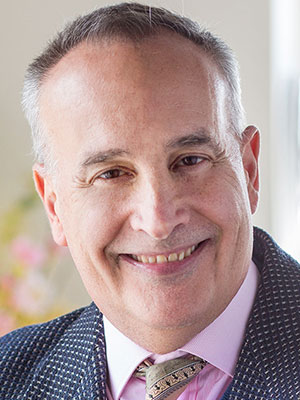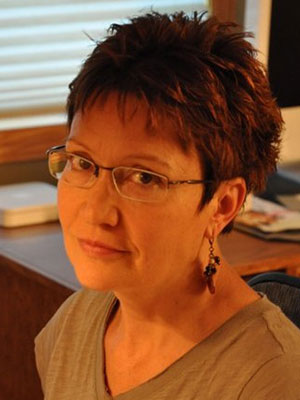I don’t feel qualified to be a caregiver for my spouse. What can I do?

Bill Goeren, Oncology Social Worker at CancerCare in New York City. Photo courtesy of CancerCare
BILL GOEREN: It is extremely normal, especially for new caregivers, to feel insecure, unprepared or overwhelmed about this new role. Caregivers are faced with a broad spectrum of unknowns, which may be felt more acutely when a loved one is newly diagnosed and just starting treatment, or during end-of-life care. No one is really prepared for these challenges, and it’s perfectly normal to feel out of your element.
There are different aspects of caregiving: the more concrete aspects, such as setting up appointments and making sure treatment is received, as well as the emotional and psychological aspects. A caregiver will play an important role in helping a loved one figure out what’s next and how his or her life has changed as a result of the disease.
In sorting through the needs of a spouse, caregivers should not overlook their own needs. They need to eat, sleep and otherwise take care of themselves. They also need downtime, especially when they are feeling overwhelmed or more emotionally fragile. It’s like what they say on an airplane about putting your own oxygen mask on first—you must take care of yourself before you can help the person who is next to you.
It’s helpful to prepare for what is happening now and what is going to happen tomorrow and the next day, as far as it is possible to do so. One of the things I’d suggest is for a caregiver to find support from other caregivers who they can speak to and learn from. Counseling may also be helpful, whether it’s in a group or individually, in person or online.
By caring for yourself and getting the support you need, you will start to feel more adequate, secure and prepared for your new responsibilities as a caregiver. In my experience, most caregivers are eventually able to surmount these challenges, even if there are still moments of doubt. However, if a caregiver is feeling absolutely overwhelmed and unable to fulfill their responsibilities, it’s time to turn to a professional, perhaps a social worker or oncology nurse. Look also to other family members or friends who can step in to help. Together, you can come up with a plan.
CARING FOR A SPOUSE // CancerCare provides free caregiver support groups for spouses and partners over the phone, online or in person. // The American Cancer Society offers advice for those about to become a caregiver. // The University of Texas MD Anderson Cancer Center shares tips on finding your identity as a spouse of someone with cancer.
Cancer and treatment have changed my day-to-day life. How do I adjust?

Dana Stewart, Cancer Survivor and Co-Founder of the Dragonfly Angel Society in Chicago. Photo courtesy of Dana Stewart
DANA STEWART: I’m a cancer survivor, nine years out, and this is the stuff nobody tells you. You are told about your treatment options, but nobody prepares you for the emotional pieces. You know your life is going to change, but you don’t know to what extent.
When I was diagnosed with breast cancer, it felt like my whole world came crashing down. But then it’s almost like you go into warrior mode. You think about your list of treatments and appointments, and you go with it. I thought I’d focus on that and deal with the rest later.
One thing I like to tell people who are newly diagnosed is to take the time to mourn the loss of the person you were before you heard the words “you have cancer.” That’s something I wish I had done sooner. As I went through treatment, I tried to put my emotions aside, because I was so worried about everyone else. I paid the price later when my emotions caught up with me. It’s OK to feel sad, mad or whatever it is that you are feeling. Working through those feelings early will help you come to a place of acceptance.
In my case, it was a month or two after my last chemo appointment that it all hit me like a ton of bricks. I could barely get up in the morning. I asked my oncologist to recommend a therapist, and talking through it helped me more than anything else. It was a game changer, and it’s another thing I wish I’d done sooner.
It will take time. I wish someone had told me that. It’s OK to not be OK. Be patient with yourself. I wanted to feel fine and to be “back to normal” again. But that’s not going to happen right away, so patience is key.
Ultimately, I was able to take a step back and realize that, if they hadn’t found the cancer, the disease would have killed me. I’ve made many life changes in the time since. I moved and changed jobs. Without the cancer, I don’t know if I would have done any of that. It made me look at everything differently. In time, you may find it does the same for you.
ADJUSTING TO CANCER // Cleveland Clinic provides tips on how to get the most out of life with cancer. // UCHealth.org explores one survivor’s approach to living a full life with cancer. // The National Coalition for Cancer Survivorship has a free podcast series on living beyond cancer.
How can I make the best possible use of my limited energy?

Barbara Tako, Cancer Survivor and Author of Cancer Survivorship Coping Tools—We’ll Get You Through This. Photo courtesy of Barbara Tako
BARBARA TAKO: There’s no doubt about it: Cancer treatments, including radiation and chemotherapy, are tiring. You may feel like a toddler resisting a nap. However, cancer fatigue is not something that sleep will fix.
Managing low energy with cancer is really about prioritizing to make the best use of the limited energy that you do have. When I was first diagnosed, a fellow survivor likened it to being given a set number of quarters per day and having to decide how to spend them.
In making those choices, self-care is essential. At the time of diagnosis, assembling a medical team you believe in and trust is one of the most crucial expenditures of your energy. Once that is in place, you can work on identifying coping tools that will help you get through it emotionally. You might try meditating, stepping outside to connect with nature, or relying on your faith system. You might find it helpful to keep your hands busy knitting or cooking, or doing another quiet activity you enjoy.
When your energy is limited, don’t be afraid to request help and support. Ask someone to bring a meal to your home or sit with you through a chemotherapy appointment. Joining a support group can be similarly beneficial. I found that nothing was more soothing during treatment than sitting in a room full of people who understood.
Cancer is physically, emotionally, mentally and spiritually draining. Remember that it’s OK to be short on energy. We are a society that tends to go for 18-hour days as we run in 30 different directions. It’s a good idea to take a step back and focus on what matters most at that particular time.
MANAGING FATIGUE // Mayo Clinic explains cancer fatigue and how to cope. // Pharmacy Times details the difference between cancer fatigue and tiredness. // UCSF Health has more tips on conserving your energy.
Cancer Today magazine is free to cancer patients, survivors and caregivers who live in the U.S. Subscribe here to receive four issues per year.




